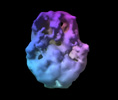Effects of Long Term Alcohol
38 y/o – 17 years of heavy weekend
use
marked overall
decreased activity
|
||
Alcohol Abuse and Brain Trauma
48 y/o — 22 years
of daily use with history of past head injury
marked scalloping overall decreased activity |
||
Effects of Heavy Nicotine & Caffeine Abuse
45 y/o — 27 year history of heavy
use
Smoking 3 packs of cigarettes and drinking 3 pots of coffee daily
Smoking 3 packs of cigarettes and drinking 3 pots of coffee daily
Now at
this point, if I’m showing these images to a substance using client in my
office I’ll often ask “So what stands out most for you seeing these images?”
(usually the client is a bit wide eyed with jaw dropped). I’ll then see if I can pick an example of
what the client’s brain might look like, for example.
“So
you’re in your late 20’s and you say you smoke pot really “just on
weekends”. Oh, here is an image of what
a late 20 year old’s brain looks like who smokes just on weekends….
...is this what your brain looks like? Client, still a bit wide eyed with jaw dropped often with a response of "Whoa". "I guess maybe you hadn't heard the concentration of THC (the active ingredient in marijuana) is way more potent now than it was in "hippy days".
I will often leave the client hanging with
the reality and consequences of their choices for a little bit and then segue
way to something a bit more optimistic.
The brain is quite adaptable and “plastic”
and will regenerate once healthier (non-substance) choices are made. For
example, here are some images of what the brain looks like while still using
(left image) and when not using a year later (image on the right).
Hope for Healing
Alcohol, Drug Abuse, Cocaine & Meth On and Off Drugs and Alcohol
Effects of drug abuse and
alcohol abuse vs one year substance free
There is hope! The brain will regenerate given the proper
conditions. These images are often a
powerful motivator for a person to realize the consequences of their choices
and begin to think twice the next time they use. I usually get a comment of...
“I DON’T want my
brain to look like that!”
Best of health and warmest regards, Paul Radkowski
info@liferecoveryprogram.com
Please join our community and share your voice…
https://www.facebook.com/
https://www.facebook.com/

























